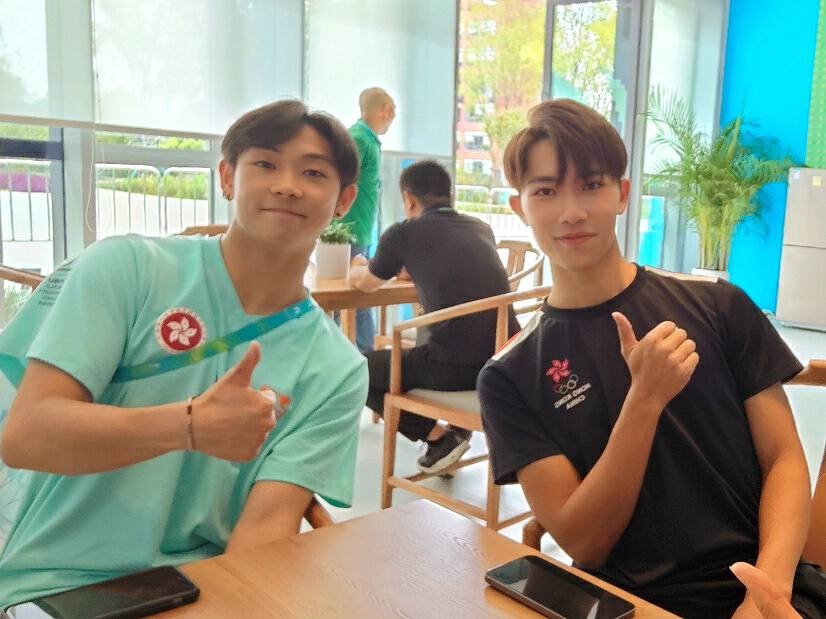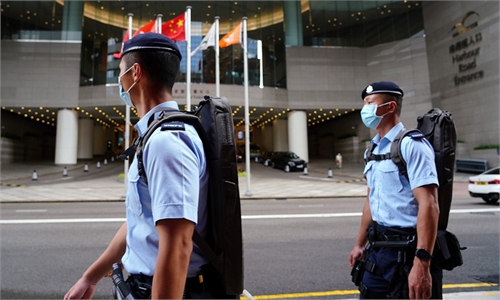Wushu presents performers' understanding of Chinese culture, fosters closer connection with mainland: HK college medalists

Wushu college athletes from the Hong Kong Special Administrative Region Hui Tak Yan (right) and Lau Chi Lung (left) Photo: Zhang Changyue/GT
Wushu is a sport where the performers can fully present their understanding of the Chinese culture and a closer connection between the Wushu learners the mainland and Hong Kong Special Administrative Region has been forged during the practicing and competition process, two Hong Kong college medalists Hui Tak Yan and Lau Chi Lung told the Global Times in an exclusive interview at the athlete village of Chengdu Universiade after claiming a gold, a silver and a bronze in the Wushu competition.
Unlike other sports where the athlete has direct or indirect physical confrontation with one another, the Wushu competition needs the athlete to push his limits to present the most formidable aspect of his body to others, said Hui Tak Yan, who claimed first place in the Men's Taijijian on July 30 at the 31st FISU World University Games.
Hui's champion was also the first gold of the Hong Kong Special Administrative Region (HKSAR) delegation. He also won a bronze in Men's Taijiquan on July 31. Hui started to learn Wushu at the age of six due to his parents because his father was a fan of Bruce Lee and his parents loved watching swordsmen films. "And I gradually love the sport because I found my charisma could be shown out during the performance. I love that feeling," Hui said.
Lau Chi Lung, who started learning Wushu at nine years old and gained the first medal for HKSAR delegation on July 30, a silver in Men's Nanquan, told the Global Times that "Chi Lung" isn't actually his original first name, but was changed from renowned general Zhao Zilong or Chiu Chi Lung in Cantonese during the Three Kingdoms period of Chinese history whom Lau admired very much.
Lau said the essence of Wushu competitions lies in athletes expressing their own understanding of the gestures and their combination with the background music. "I'm not the type who sits quietly in the classroom and studies. I enjoy playing Wushu on the stage where I can truly find myself."
As Wushu embodies the profound essence of traditional Chinese culture which passed from one generation to another, Hui said it is very crucial for the younger generation comprehend why the older generation present the routines and gestures in such a way rather than just copying them. "After deeply understanding the meaning and original intention behind of these routines, you can 'create your unique routines' based on your interpretation," Hui said.
Both Hui and Lau have traveled to dozens of cities across the country from childhood to train and have competitions with local Wushu teams. "Athletes coming from teams in different places usually have their typical gestures. We came to exchange gestures with peers, gaining not only technical improvement but genuine friendship," Hui said.
Lau and Cao Maoyuan, the Wushu athletes who claimed the first gold medal for the Chinese delegation, are old friends. Lau said he stayed in contact with Cao through WeChat in the past three years where they exchanged their training video clips to evaluate each other's gesture. "But it's not comparable when we met again face to face. We are so excited to see each other. In the athletes' village, we together dined, had a walk and talked about our life," said Lau.
The HKSAR has sent more than 140 athletes, its largest-ever delegation to the Chengdu Universiade, which received jubilant and sustained cheers from the audience as they marched into the stadium at the opening ceremony on July 28.


